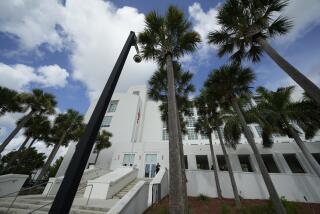Independent-Counsel Law Revamp Urged
WASHINGTON — At a time when three independent counsels are investigating top Clinton administration officials, a panel of former independent counsels said Friday that the law under which they were appointed is being applied too broadly and too often.
The statute providing for independent counsels should be reserved only for those rare and momentous cases, perhaps no more than one per decade, where the president or his closest associates are accused of seriously misusing federal power, the former independent counsels said.
“We need a continuation of the statute, but I favor a narrowing of it,” said Harvard Law Professor Archibald Cox, the Watergate special prosecutor whose firing by President Richard Nixon led Congress to set up the current system of independent counsels.
Cox said the law should be revised to “narrow the number of people who can be investigated, limit the types of crimes and . . . maybe limit the duration [of the investigations] to one year,” he said.
“Everyone agrees it has been overused,” added Lawrence Walsh, the independent counsel in the Iran-Contra case during the Reagan administration. “It should be only for the rare instance . . . the misuse of federal power. I don’t think it should apply to something a federal official did before he took office or for something personal, like smoking marijuana.”
Under the law, an attorney general receiving an allegation of wrongdoing involving an executive branch official covered by the statute is required to have the FBI conduct a 90-day preliminary investigation to see if there is a reasonable likelihood the accusation is true. If the FBI finds such indications, the attorney general is charged with asking a special panel of the U.S. Court of Appeals to choose an independent counsel.
Once appointed, an independent counsel has broad authority and virtually an open-ended budget, although Congress does reserve the right to review the prosecutor’s funding periodically.
For nearly 20 years, the office of independent counsel has been a perennial topic of debate and dispute in Washington’s legal community. On Friday, the American Bar Assn. brought together most of the former independent counsels and several prominent Washington defense lawyers to debate whether the law should be retained, repealed or revised.
During the 1980s, many Republicans favored repealing the law when many friends and allies of former President Reagan came under investigation by independently named prosecutors. However, Democrats in Congress then enthusiastically supported it.
Now, the two parties have switched sides. Many Democrats are upset, not just by the long-running investigation of the Whitewater saga, but the prolonged investigations of Cabinet officials such as outgoing Housing Secretary Henry Cisneros and former Agriculture Secretary Mike Espy.
But the Republicans who now control Congress say they like the law and have been urging the appointment of even more prosecutors. Atty. Gen. Janet Reno is currently reviewing a Republican request to seek the appointment of an independent counsel to investigate Democratic fund-raising.
Not everyone has switched positions. Defense lawyers and most Justice Department prosecutors condemned the law when it was passed in 1978, and they still condemn it.
“The law was and is nothing short of an abomination,” said attorney Herbert J. Miller, who headed the Justice Department’s criminal division under President Kennedy and later defended Nixon while in private practice. “It’s plain to me these investigations are political. They’re driven by Congress.”
It’s better, he said, to leave the law in the hands of career prosecutors at the Justice Department.
*
But James C. McKay, the independent counsel who investigated Reagan’s former Atty. Gen. Edwin M. Meese III and Reagan advisor Lynn Nofziger, said: “Let’s face it. The independent counsel statute is here to stay. Let’s see how we can make it better.”
The 10-member panel also included Watergate prosecutor Charles F.C. Ruff and Leon Silverman, the independent counsel who investigated former Reagan administration Labor Secretary Raymond Donovan. The panel seemed to agree on three points.
First, a prosecutor with independent authority is needed when wrongdoing involves the president himself or his closest associates.
As Cox said, “it gives the public the assurance” of fairness and impartiality if a possible criminal case involving the president is handled by “someone outside the executive branch.”
This is true whether the investigation leads to an indictment or the official being cleared, noted former Deputy Atty. Gen. Irvin Nathan. Since 1978, 11 of the 18 independent counsels have cleared the officials targeted in the investigations. Those decisions are accepted by the public because the investigators were independent, Nathan said.
Second, the independent counsel should take the job full-time, not as part-time like Whitewater counsel Kenneth W. Starr. “What could you be doing with your time that is more important than that?” Nathan asked.
And third, the scope of the law needs to be sharply narrowed. Too many officials are now targeted by independent counsels, they said. Many of them then spend years and hundreds of thousands of dollars trying to clear their names, they said.
Walsh also stressed it is important not to target federal officials for these special, high-profile investigations over matters that took place before they came to Washington.
White House officials have complained that the Whitewater investigation, unlike Watergate or the Iran-Contra scandal, has dealt mostly with alleged financial shenanigans in Arkansas that took place long before Clinton became president.
But Clinton’s critics say Starr’s wide-ranging investigation is proper because they charge that the president and his White House aides have misused their power to cover up earlier wrongdoing.
More to Read
Sign up for Essential California
The most important California stories and recommendations in your inbox every morning.
You may occasionally receive promotional content from the Los Angeles Times.











